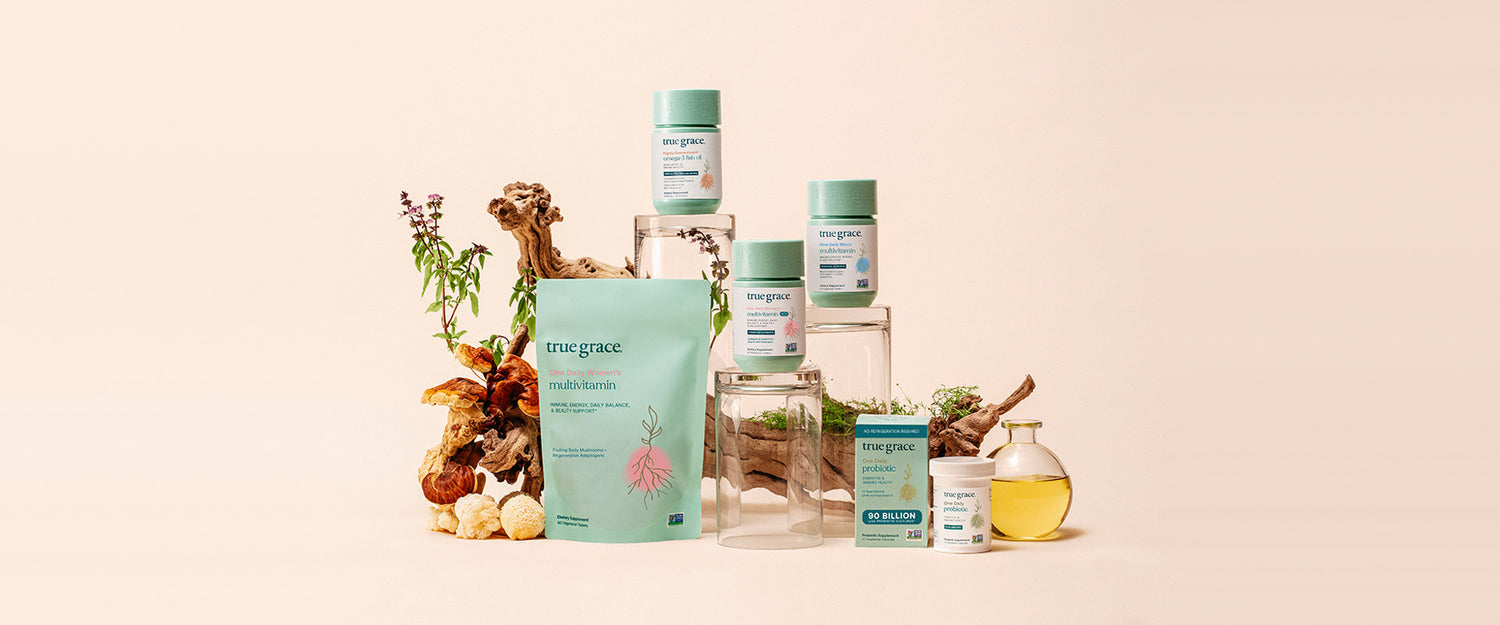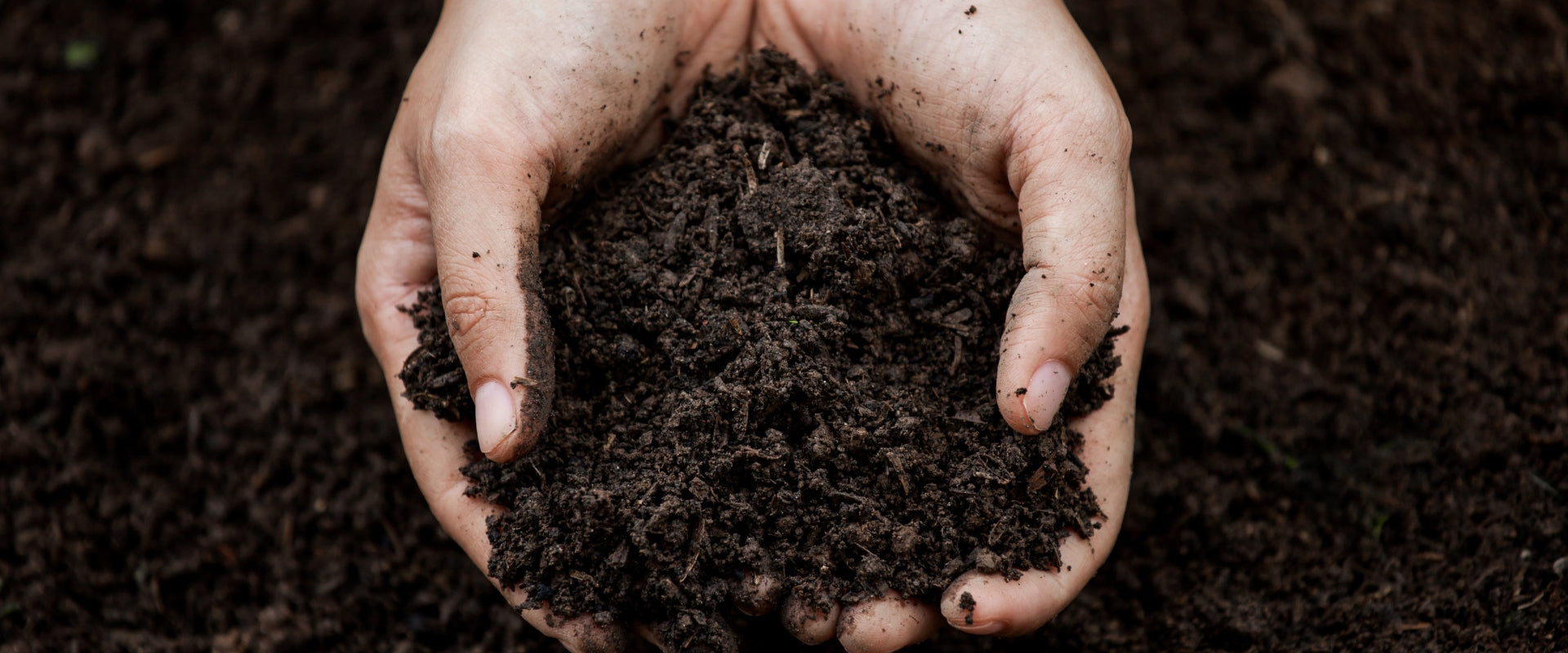Times have changed.
Here’s why nutrient density, adaptogenic herbs, medicinal mushrooms, and regenerative ingredients are must-haves in your multivitamin.
Choosing a multivitamin used to be a pretty low-stakes operation. Fifty years ago, people were getting a decent amount of nutrients from food, and multivitamins were a top-up. As long as a variety of vitamins and minerals appeared on the multi’s label, you were good to go.
But times have changed. Our diets have skewed heavily toward grains, cooking oils, and sugar and away from fruits and vegetables.1 And even if you’ve bucked the trend and eat relatively healthy, you’re faced with this inescapable fact: Food grown today is far less nutrient dense than it was in our parents’ or grandparents’ generations.
To put it bluntly, you need to eat eight oranges to get the same amount of Vitamin C your grandmother got from one orange. That’s a lot of oranges.2
Nutrient density has become critical
Should you start a savings account just to buy citrus fruit? Not necessarily. Should you bother to eat fruits and veggies at all? Yes. Should you still strive to get most of your nutrients from whole foods? Absolutely.
But you should also take a good, hard look at your multi and demand more from it — specifically, more nutrient density.
It’s not enough for a multivitamin to offer you a variety of nutrients. All those nutrients need to be present in meaningful amounts. A sprinkle or a dash isn’t enough in today’s nutrition landscape, where more than 90% of Americans are lacking in one or more essential vitamins or minerals.3
Adaptogenic herbs are a vital addition
While nutrient deficiencies are serious, there’s another prevalent and alarming health issue that’s on the rise: stress. In 2020, the American Psychological Association saw the first significant increase in average stress levels among American adults since it began conducting national surveys on stress in 2007.4
This is big and bad news, health-wise. Chronic stress increases the risk of anxiety, depression, headaches, heart disease, sleep issues, weight gain, and memory problems.5
Stress can also affect digestion, including how well nutrients are absorbed.6 That means you can take the best, most nutrient-dense multivitamin, but if you’re not combatting the effects of stress simultaneously, you’re not likely to reap the full benefits of the nutrients.
A truly modern multivitamin should contain adaptogenic herbs. Adaptogens are a specific class of herbs that help the human body adapt to and mitigate the negative effects of stress. Adaptogenic herbs like Ashwagandha and Holy Basil (Tulsi) boast a long history of use, and an emerging body of scientific research shows they support a healthy stress response in specific ways. Ashwagandha has been shown to calm the nerves and support cognitive health in the face of stress. Holy Basil contains a compound called eugenol that’s been shown to combat stress and enhance mental clarity by lowering levels of the stress hormone cortisol.
Medicinal mushrooms are no-brainers
The ability of medicinal mushrooms to support multiple facets of health has long been known, but in recent years, the spotlight has been squarely on their immune-supportive qualities (largely courtesy of compounds in mushrooms called beta-glucans).7
We’re all facing more immune challenges than ever before. So, while your mom or grandma might have been fine with a multi that gave them a little extra Zinc and Vitamin C, you can do one better by choosing a multi that also contains medicinal mushrooms.
Regenerative ingredients are the gold standard
Yes, the food we grow today is less nutritious than 50 years ago. But we can stop crops’ nutritional value from tanking further. In fact, we can reverse the process.
The key is regenerative agriculture, a way of farming that regenerates the health of the soil.
Why the focus on soil? Because soil is the basis of nutrition. It provides the building blocks for plants to create the vitamins and minerals we all rely on. Healthy soil grows healthy, nutritious food.
Yet incredibly, modern farming methods degrade soil and even cause it to disappear thanks to practices like tilling (which destroys soil’s structure) and pesticide use (which kills beneficial microbes in the soil). Half of all soil on earth is now degraded, and if we don’t change how we farm, we have fewer than 60 harvests left before the earth’s topsoil disappears.
That’s why supporting a move to regenerative agriculture is essential. Regenerative agriculture leaves the soil’s surface undisturbed and keeps it as covered and protected as possible. It nurtures the soil’s microbiome and overall health. It even creates new soil.
When a multi includes regenerative herbs or other regeneratively grown ingredients, you can be sure of two things.
Ready for a modern multivitamin?
At True Grace, we’ve thought long and hard about how to craft multivitamins that are equal to today’s challenges. We aren’t interested in rehashing the same formulations that have been around for years.
We still include essential vitamins and minerals in our multis, of course, but we get our vitamins from natural sources, use fermented and chelated minerals, and offer all these nutrients at meaningful doses. We mix in organic and regeneratively grown adaptogens. And we include a blend of organic medicinal mushrooms that’s tailored to each demographic we serve: men, women, and women 40 and up.




